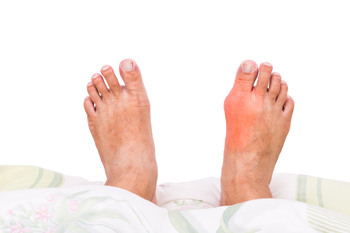3885 S. Decatur Blvd Suite #1080
Las Vegas, NV 89103

Bunions manifest primarily as the big toe angling towards the other toes, causing a bony protrusion on the inner edge of the foot. Symptoms include pain, swelling, callused skin, and foot shape changes. Treatment aims to alleviate discomfort and may involve painkillers, orthotics, or surgery for severe cases. Untreated bunions can worsen and lead to complications like arthritis or toe misalignment. Bunions are more prevalent in women, possibly due to footwear choices like high heels. Other causes of bunions include genetics, arthritis, and ill-fitting shoes. Prevention involves wearing properly fitting shoes with ample toe room, and avoiding tight or high-heeled footwear. Surgery is often the only solution for severe cases but may not guarantee complete recovery. If you have a bunion that causes you pain, it is suggested that you make appointments with a podiatrist for regular monitoring and treatment.
If you are suffering from bunions, contact Loren Hansen, DPM of Ankle & Foot Medical Center. Our doctor can provide the care you need to keep you pain-free and on your feet.
What Is a Bunion?
A bunion is formed of swollen tissue or an enlargement of boney growth, usually located at the base joint of the toe that connects to the foot. The swelling occurs due to the bones in the big toe shifting inward, which impacts the other toes of the foot. This causes the area around the base of the big toe to become inflamed and painful.
Why Do Bunions Form?
Genetics – Susceptibility to bunions are often hereditary
Stress on the feet – Poorly fitted and uncomfortable footwear that places stress on feet, such as heels, can worsen existing bunions
How Are Bunions Diagnosed?
Doctors often perform two tests – blood tests and x-rays – when trying to diagnose bunions, especially in the early stages of development. Blood tests help determine if the foot pain is being caused by something else, such as arthritis, while x-rays provide a clear picture of your bone structure to your doctor.
How Are Bunions Treated?
If you have any questions, please feel free to contact our office located in Las Vegas, NV . We offer the newest diagnostic and treatment technologies for all your foot care needs.